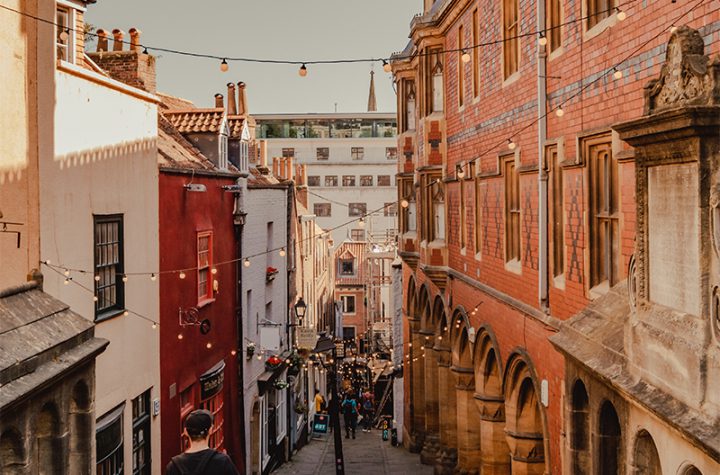
Women. Suddenly, they are visible. Great-grandmothers, grandmothers, mothers, teenagers, baby girls. They have slowly but surely reclaimed a corner of a public ground and pitched their tent. They have also reclaimed a tiny but visible corner of a balcony in a crowded shopping area where a hoarding has been placed and young children draw.
The protesting women have reclaimed a road forcing the traffic to steer to the other side. This is Road No. 13A, in Shaheen Bagh, nestled deep in the belly of South Delhi, where houses are so densely packed that daylight struggles to make its way in. All around you are tiny shops and houses. The women under the tent have refused to budge, come rain or storm. It is a Gandhian satyagraha on display peaceful, assertive, relentless and in its fourth week. The men dont enter their space unless they are invited. They stand on the sidelines. Hum yahin pe theek hain (we are okay here), says a young man who has come from Muzaffarnagar. People looking for a religious sign or specific attire to stereotype a community, will find instead a proliferation of colours and a diversity of religions here. Ambedkar is back where he belongs. Amongst his people. So is Gandhi, and so is the tricolour.
On the evening of December 15, when the Delhi Police, which reports to the Ministry of Home Affairs, entered the Jamia Millia Islamia university campus, 2 km from Shaheen Bagh, and began to lathi charge the students, the mothers stepped out, appalled by the violence they saw on television screens inside their homes. There was no tent that day but we decided to come out for the sake of our children, says Sameena Khan. The tent came a day later. She says softly, You banned notes. We didnt say anything. You spelt out your verdict on Babri Masjid. We kept silent. Then, you attacked our children. Thats when we decided to come out. Our fight is not with the government, but we are citizens of this country along with everyone else.
Here to stay
Sameena has been coming to Shaheen Bagh every day since December 16. Nothing seems to dampen the spirits of the women. They say in unison that the fight is for their children. I will be gone in a few years when my maker summons me. But what about them, asks Sarvari, who has been on a hunger strike. Saina, 33, quickly finishes her housework to reach Shaheen Bagh. Last Saturday, she came with buckets of soup. I cannot stay at home when all of this happening, she says. My feet bring me here.
Somebody has brought boiled eggs, someone else mathri (a savoury). Tea flows like water, made continuously by some mysterious persons. Its a relay strike the likes of which the government has not seen before. Women finish their housework and come to the spot, relieving their sisters who must head home to complete their chores. None of them has ever done anything like this before. Cops stand in anticipation of trouble one odd stone hurled could bring matters to a boil, allowing them to retaliate. But it doesnt happen. And the women keep a close watch.
They are disappointed that nobody from the government has visited them, heard them, or spoken to them, but they are not discouraged. They have a simple question: if the PAN card is no longer proof of identity, if the passport is no longer proof, if ration cards are not accepted, and if Aadhaar has no value what will convince the government of our Indianness?
The women of Shaheen Bagh are not alone. Across the country, women are coming out of homes and coming out of purdah to take to the streets. Significantly, they have the support of their families to do so. And their numbers are only growing.
Sitting amidst hundreds of people at a protest at Bengalurus Town Hall, 25-year-old Nidhi (name changed) is earnestly scribbling notes, jotting down the names of speakers. As an employee of a private company, this kind of involvement is novel and exhilarating. I want to be better informed about these issues. I also want to connect people who want to be involved but dont have any information, she says. Over the past few weeks, she has been a part of five protests in the city, besides attending meetings and talks.
Nidhi admits that it has been a struggle convincing her family that the law is discriminatory and that she needs to register her protest. My parents dont live here, and have no idea that I participate, she says. Nidhi and her colleagues are trying to negotiate with their HR team so that they can attend protests and work additional hours to compensate. I want to show up because this is a devastating threat to so many marginalised communities, says Nidhi.
I am not alone
Homemaker Vidya Narayan felt compelled to step out because she has been extremely uneasy and disturbed by the CAA. Nobody around me was as disturbed as I was. There was nobody I could reach out to; and then I read a forward about a protest and called my friend and told her to join me.
Since that first protest, there has been no looking back. She has been at more than eight protests so far. What motivates her? I teach my children values like secularism and equality. With the present turn of events, it is as though I am telling my children to become good players on a pitch filled with thorns. I believe it is my duty to fight so that my children have a better future. She tries to return home by the time her children are back from school, but she has also taken them to two protests. I am glad my children are able to see that they have to fight for the rights that we sometimes take for granted.
Mallige is with Mahila Munnade, a womens rights organisation. She has been an activist for two decades now. Mallige says that the large number of women coming out for the anti-CAA protests reflects an accumulated anger and frustration; an undercurrent neither identified nor acknowledged by any political party. Besides, social media and messaging platforms have made it possible to make connections, she says. Among Muslims, there has been encouragement to get organised and to take part. It is an indication of the upward mobility of women in the socio-economic as well as the political spheres. Women are more ambitious and assertive now, and ready to fight for their rights, says Mallige.
When Bob Dylan sang The Times They Are a-Changin in the 60s, it was prophetic. Decades later, it is the women in Hyderabad who, as the bard put it, are shaking windows and rattling walls. They have been central in organising the guerilla Hyderabad flash mobs against CAA. On January 4, they converged in enormous numbers at the Million March, assembling within minutes of the attack by masked men on JNU students. All this, while juggling family and career and tackling patriarchy.
Arshiya Sayeed, architect and first-time protester, is discreet about who in her family she shares her protest plans with. The governments obnoxious move is to disenfranchise an already marginalised community. It is an institutionalised way of keeping Muslims out of spaces where they can develop an opinion or get a leadership role, she says.
It was January 5, a day after the Million March. Khalida Parveen, 64, a social activist, was returning from Nirmal, a town in Telangana, when her WhatsApp began to be inundated with images of the violence at JNU. Within 30 minutes, around 50 people reached the Ambedkar statue and we staged a protest for three hours. For me, these protests are not about one community. They are to save the country and its pluralistic nature, says Khalida.
We are all Indian
So, what is it about these protests that has propelled women, especially Muslim women, to the streets? See, this is not a community-specific issue. It is not about reservations, or triple talaq or Muslim personal law. It is about the very existence of Indians and the Constitution. If the Constitution is safe, so are Muslims, Hindus and Christians. The government has put the burden of proof on Indias citizens. That is why you see so many first-time protesters across communities and walks of life, says Khalida.
A week after the JNU unrest, the United Muslim Action Committee, a body of faith leaders, gave a call for a Tiranga Rally. Tens of thousands responded, including many women. Saira Fatima, at the head of a contingent of women protesters, arrived at the vast Mir Alam Eidgah grounds with her mother, sisters, and cousins. The cause, she says, has united family. The whole family, including my father, is here. This is a question of wajood (existence). Given these laws, tell us where will we go? To Pakistan or Afghanistan? We are Indians. We have everything here, she says.
Holding aloft a No CAA, No NRC, No NPR placard, Sumaira Syed, an MBA graduate and first-time protester, says, This protest is not about being Hindu or Muslim. It is about equality. The Citizenship Bill should not have been passed. Every protest is important.
We are at Mumbais Azad Maidan. The thousand-odd protesters are buzzing with excitement and solidarity. One speaker finishes his speech and passes the mic to a simply dressed young woman. She steps up, smiling slightly. The crowd cheers.
CAA Murdabaad! her voice rings out.
Murdabaad! Murdabaad! the crowd roars back.
This is Suvarna Salve, a member of Samta Kala Manchs cultural wing, who has been part of the Ambedkarite movement for the past decade. I am a singer and I have been singing songs about the struggles of revolutionaries like Ambedkar, Savitribai Phule and Bhagat Singh. The protests are an immediate reaction to something happening to someone else. It is our empathy, as women, that has brought us out of the door, says Suvarna.
In Mumbai too, women have been at the forefront, putting their homes and jobs on hold for the cause. Lawyer and activist Lara Jesani says, Women value human rights more because they have often been denied them in history. The CAA not only creates a communal divide but also is first going to impact women. Due to entrenched patriarchy, many young women are denied documents because their families believe they will soon get married anyway and their in-laws will take care of it. They often dont have property documents even where they own land.
Lara is a member of organisations like Mumbai Against CAB and Hum Bharat Ke Log, which have been organising protests in Mumbai. Sandhya Gokhale, a member of the Forum Against Oppression of Women, is busy organising resistance activities and meetings. Several others, not physically on the ground, have taken it upon themselves to keep the word alive, through tweets and posts and Insta shares. They are offering safe spaces, food, chargers and more.
Just like the fabulous women of Shaheen Bagh, women everywhere are simply digging their heels in. And that alone is a shout out for everyone to join them. The score so far: Women 1, Government 0.
With inputs from Tanu Kulkarni in Bengaluru, Syed Mohammed in Hyderabad and Ananya Biswal in Mumbai.





More Stories
The South Australian government has promised to deliver the “biggest hit of economic adrenalin in South Australian history” in Tuesday’s budget.
Boris Johnson will proceed with his controversial Brexit bill despite US president-elect Joe Biden having previously warned the UK over the draft legislation.
Singapore-based Nektar.ai, a productivity platform for sales teams, has raised $2.15 million in seed funding. Founded earlier this year, Nektar has been working in stealth mode with five companies, and has plans for an early adopter release before a public la…